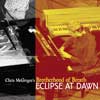I will also, in the main, write about albums that are available on CD, though there might be some exceptions. The reason for this is that CDs are simply more accessible these days than vinyl. I don't even have a turntable anymore, though that might change sometime!
The albums I will be writing about are:
1. The South African releases:
- Dollar Brand Plays Sphere Jazz
- The Jazz Epistles Verse 1
- The Castle Lager Big Band: Jazz: The African Sound
- Winston Mankunku Ngozi: Yakhal' inKomo
- Dollar Brand: Mannenberg.
2. The exile releases:
- Abdullah Ibrahim (Dollar Brand): Water from an Ancient Well
- The Chris McGregor Group: Very Urgent
- Abdullah Ibrahim with Gato Barbieri: Hamba Khale (sic - should read Kahle, I think)
- The Brotherhood of Breath: Live in Willisau
- Hugh Masekela: Home is Where the Music Is.
Some of the albums, like Mannenberg and Yakhal inKomo have achieved almost cultic status among jazz fans in South Africa. Others, like Very Urgent and Live at Willisau are almost unknown in the community of South African jazz fanatics.
There are of course many more albums both local to South Africa and released abroad that are great and I will I hope get to writing about them also in time. The ten that I have selected to write about now are a personal selection and in no way indicate a negative view of any albums so far not listed - watch this space, as they say!
Jazz in South Africa has been called "the peoples' music" though I'm not sure that this still applies. Like jazz elsewhere it has become something of a specialist interest, though it is still written about quite frequently. Indeed two recently published books bring out some of the magic and excitement of South African jazz.
Firstly the brilliant Soweto Blues by Gwen Ansell deserves an honoured place on any jazz lover's bookshelf. It was published in 2004 by Continuum, New York. It is a distillation of the best parts of an eight-part radio series called Ubuyile/Jazz Coming Home which was broadcast on the network of community radios in South Africa.
Secondly the photographer Jurgen Schadeberg, who wonderfully captured the images of the heyday of South African jazz in the 50s and 60s, has produced a book entitled Jazz, Blues and Swing, with great photographs and written contributions by Don Albert, Gwen Ansell, Darius Brubeck and Hotep Idris Galeta. Its a wonderful book published by David Philip in 2007. This book also is highly deserving of a place on your bookshelf.
The place of jazz in South African culture and society was acknowledged recently by President Thabo Mbeki who honoured the exiled Blue Notes with one of South Africa's highest official honours, the Order of Ikhamanga in Silver, for "excellent achievement in the genre of jazz music, contributing to the development of music in the South African townships and defying the apartheid laws by forming a multi racial group."
So, official recognition at the highest level for an art form that not too many years ago was regarded officially as beyond the pale.
This is the jazz that I will celebrate on this blog over the next little while. This is the music that has inspired, comforted and uplifted people for many decades, through the unbelievably dark days of the apartheid era and into the new dawn of freedom for this beautiful country. This music was the sound track of the struggle and is now the emblem of freedom. Its practitioners suffered for the music and many have died along the way. I celebrate their memories also.

